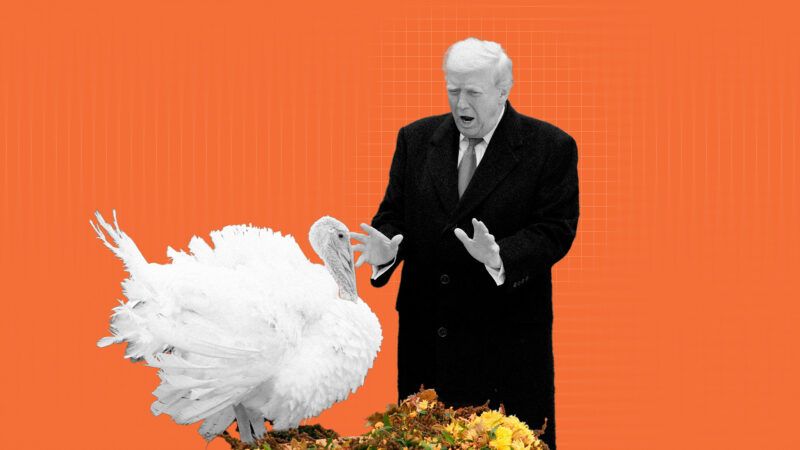Trump Pardoned Gobble and Waddle. He Should Pardon More Deserving People, Too.
The president loves freeing people. His controversial clemency grants should not obscure the fact that the pardon power is incredibly important.

President Donald Trump on Tuesday issued two pardons. It was one of the more conventional uses of the power we've seen from the president. The recipients were not convicted of taking bribes, or defrauding people to spend money on plastic surgery and OnlyFans, or engaging in a crypto money-laundering scheme.
Gobble and Waddle are turkeys. The pair will thus avoid becoming someone's dinner centerpiece tomorrow, as is Thanksgiving tradition. Lucky them.
Three years ago, I wrote about why the president—Joe Biden at the time, but all presidents, really—should focus on pardoning people, not turkeys. I'm no Scrooge. I love a holiday custom. It can stay! But the idea, hopefully, is that it also be liberally applied to humans, as the president's ability to give clemency is effectively the only check on overzealous prosecutions and righting unjust sentences at the federal level.
During his second term, Trump seems to have taken this general advice. His immediate blanket pardon for those convicted of offenses related to January 6, for example, gave clemency to over 1,500 people, when many commanders in chief prefer to wait until the 11th hour to sign off on grants (if they're generous at all, which is a big if). Trump, meanwhile, appears to really, really like freeing people this go-round. We love that energy. More presidents should lean into this!
Whether or not they will, or if the public will want them to, is another question. Trump's freehanded record on clemency has been somewhat complicated by the recipients. The January 6 pardons were unpopular, particularly for those convicted of violent crimes. Just 16 percent of Americans approve of the president commuting the sentence received by George Santos (the former Republican congressman convicted of wire fraud and identity theft), while 12 percent support him pardoning Changpeng Zhao (the billionaire convicted of money laundering in connection with his crypto company, Binance), according to a recent YouGov/Economist survey. This comes after Biden ended his term shortly after pardoning his son, Hunter.
Public perception of the pardon power, in other words, is taking a beating. The skepticism is understandable—it probably isn't a great idea, for example, to pardon a sheriff who took bags of cash from rich businessmen in exchange for law enforcement badges. Touché. But that does not change the fact that clemency remains a lifeline for deserving federal inmates who have spent years in prison, and who deserve a second chance.
Trump himself understands this. In his first term, he commuted the sentence of—and later fully pardoned—Alice Marie Johnson, who in some sense epitomizes what the pardon power is designed to correct: sentenced to life in prison for a first-time, nonviolent drug offense.
She is, of course, not alone. In the same pardon piece I wrote in 2022, I highlighted one such prisoner: Edwin Rubis, who, at the time, had spent about 25 years behind bars for conspiracy to distribute cannabis. According to the Bureau of Prisons, he is still incarcerated, and is not due to be released until 2031. The president thankfully loves freeing not just turkeys but also people. Perhaps an idea?
